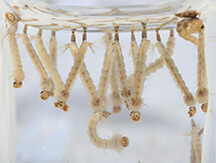Dengue virus and mosquito-borne disease experts
December 9, 2015
 |
|
Mosquito larvae "snorkeling" in the Hill lab. Larvae breathe air through siphon tubes on their abdomens. (Purdue Agricultural Communication photo/Tom Campbell) |
WEST LAFAYETTE, Ind. — The number of confirmed cases of dengue fever in Hawaii reached 139 on Dec. 7. Purdue University experts on dengue virus and mosquito-borne disease are available to discuss the virus, how it spreads and interacts with humans and mosquitos, mosquito control, and ways to protect from mosquito bites.
Richard Kuhn, professor and head of biological sciences, studies the replication of dengue virus and its interactions with human and mosquito hosts. Kuhn, along with Michael Rossmann, Purdue's Hanley Distinguished Professor of Biological Sciences, was part of the team to first map the structure of the dengue virus in 2002. Kuhn and Rossmann continue to identify targets for vaccines, antiviral drugs and treatments. Kuhn also is the inaugural director of the Purdue Institute for Inflammation, Immunology and Infectious Diseases (PI4D).
CONTACT: Richard Kuhn, 765-494-4407, kuhnr@purdue.edu
Research website: http://bilbo.bio.purdue.edu/~viruswww/Kuhn_home/research.php
Related releases:
Discovery points to new approach to fight dengue virus
Research points to possible new route to fight dengue virus
Findings reveal how dengue virus matures, becomes infectious
Catherine Hill, professor of medical entomology, vector biology and a public health Extension specialist, studies the biology of insects that cause human diseases. One focus of her research is on the biology of mosquitoes and ticks that impact human and animal health. She is the coordinator of the Purdue Entomology Public Health Extension Program, which aims to reduce transmission of vector-borne diseases through education. Hill can discuss transmission, epidemiology, symptoms and prevention of mosquito-borne diseases. She also can discuss control of mosquitoes and other medically relevant pests including ticks, lice, fleas, chiggers and bedbugs.
Hill also collaborated with Val Watts, interim head of the department and professor of medicinal chemistry and molecular pharmacology, to identify a new class of insecticides that could provide a safer, more selective means of controlling mosquitoes that transmit infectious diseases. Hill and Watts used the mosquito genome to pinpoint chemicals that disrupt the mechanics of dopamine, leading to the insect's death. The chemicals are more selective than current insecticides, which bind readily to molecules in humans and non-target insects.
CONTACT: Catherine Hill, 765-496-6157, hillca@purdue.edu
Related releases:
Mosquito- and tick-borne diseases: transmission, symptoms, prevention
New class of insecticides offers safer, more targeted mosquito control
Writers: Elizabeth K. Gardner, 765-494-2081, ekgardner@purdue.edu
Natalie van Hoose, 765-496-2050, nvanhoos@purdue.edu

